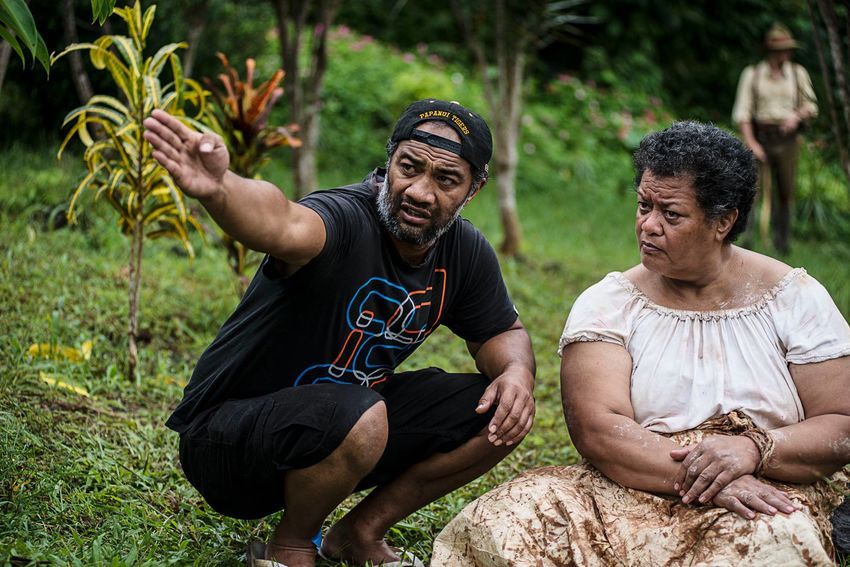

PISA fouding member Jeremiah Tauamiti says a potential US tariff could have wide-reaching impacts on the NZ-Pacific film sector.
Photo/NZ on Screen/Canva
US tariffs on foreign films: A double-edged sword for NZ industry
Industry creatives say the proposed tariffs could halt large-scale productions, cut jobs, or create space for local stories to take centre stage.


Rising costs hit Pacific families hard as interest rate decision nears

Fiji fast-tracks needle programme as new study shows HIV cases surging at record pace

‘Shot put queen’ Dame Valerie Adams leads Pacific pride at NZ's Halberg Awards 2026

Sāmoa tightens control of district funds with new seizure powers

Rising costs hit Pacific families hard as interest rate decision nears

Fiji fast-tracks needle programme as new study shows HIV cases surging at record pace

‘Shot put queen’ Dame Valerie Adams leads Pacific pride at NZ's Halberg Awards 2026
Screen advocates say the looming tariffs on films made abroad by the United States could have consequences and opportunities for the local film industry.
This follows US President Donald Trump’s plans to impose a 100 per cent tariff on “foreign-made” films.
Irene Gardiner, executive producer at the Screen Producers Guild, says the wording of the proposed tariffs is confusing.
Speaking to William Terite on Pacific Mornings, Gardiner says placing a trade tax on American productions that shoot or use post-production services in Aotearoa would be “devastating for the New Zealand screen industry”.
“That's a big chunk of the work that we do here, the money that goes into the economy, the work that our screen sector workers work on, it would be massive and incredibly tough for us,” she says.
Gardiner says tariffs won’t address the issues that have contributed to a slowdown in Hollywood, such as the pandemic, industry strikes, and the Los Angeles fires.
“Productions don't only come to New Zealand because of our incentive system because ours is relatively low by global standards,” she says.
“They come here because they're specialist people. They come here because we've got amazing landscapes that are needed for certain types of films. So it's quite confusing and there's a lot to be worked through, but it will be unsettling for people.”
Jeremiah Tauamiti, a founding member of Pacific Islands Screen Artists, also told Terite that Hollywood film crews are a major source of employment.
Watch the full interview with director, screen writer, and PISA founding member Jeremiah Tauamiti below.
“[With] productions like Avatar, there are literally hundreds of people that were able to be employed over a long period of time. So if films like that are halted, it just means that those people don't get to work on productions like that.
“What that means - that local productions have to level up, they have to make things ourselves and not solely rely on those big productions that come over.”
An upside
Dana Youngman, a strategic adviser at the New Zealand Film Commission, earlier praised the success of Pacific-led content among mainstream audiences.
“With the success of Tinā in our cinemas … right now, we have the world’s attention. People are saying that we have the chops to take on the world,” she says.
Tauamiti says less overseas competition could allow for local stories and talent to shine.

Jeremiah Tauamiti on set while directing short film Liliu in 2018. Photo/Raymond Sagapolutele Liliu/Sunpix
“For too long, we've probably been the workers for some of these big productions and only that,” he says.
“Hopefully, what this is going to do is put more of a focus on guys like Miki Magasiva and Stallone [Vaiaoga-Ioasa]. Hopefully, the Film Commission or New Zealand On Air are going to keep pushing to support us so that we can compete with US productions.”
Tauamiti’s latest documentary, Faith Faith Footy: A Pasifika Rugby Story, won Best Documentary and Best Pasifika Programme at the 2024 Television Awards.
Tauamiti says that their production, which spanned five countries, required smart funding strategies, and the tariffs could encourage productions to “level up” talent in the region.
“We couldn’t send our crew or myself to all of those places, so we were able to support Pasifika filmmakers in Sāmoa to shoot a portion of our film and in Fiji as well,” he says.
Watch: Trump says he'll meet film-industry officials on tariff plan.
A national concern and opportunity
A March report from the Ministry of Foreign Affairs and Trade states that New Zealand's film industry generates $3.5 billion each year, with roughly a third of that coming from the United States.
In a recent post-cabinet meeting, Prime Minister Christopher Luxon praised the “amazing people” and “incredible technology” in the film sector, reiterating his stance against the US tariffs.
“We’ve advocated strongly that we don’t believe tariffs is the way to go forward. We continue to do that, but importantly, there are also swings and roundabouts and opportunities that come in that environment as well,” he says.
Gardiner says they are considering the cultural, domestic, and wider sector implications, but warns that it’s too early to speculate until more details are available.
“If the very worst happened and we did have a reduction, then at that point you'd probably want to look at: ‘What else can we do? Can we actually stimulate domestic more and invest more in there?’ But that's kind of getting quite far down the track.”

Feature film Tinā, directed by Miki Magasiva, has enthralled audiences in Aotearoa, Australia and beyond. Photo/File
Tauamiti suggests that this situation could allow the industry to explore more sustainable practices.
“Economically, if films don't come here, that's going to be a major setback. But I think it's time that we try to be a little bit more smart in the way we deal with the proposed tariffs,” he says.
“It has to always come back to how are we going to survive and how are our creators going to survive, and if that means that at a certain level we have to do things differently, then so be it.”